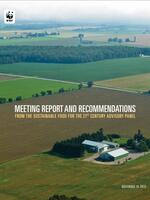The challenge of feeding a global population sustainably arises from an alarming array of numbers: some that are rapidly increasing, others that are dropping dramatically—and that static “one” that is our planet.
The increase of more than 2 billion people globally by 2050 will be accompanied by higher incomes and greater demand for not only more food, but more livestock-based foods such as beef, pork, poultry and dairy. Agriculture already uses vast amounts of natural resources, with significant environmental impacts across the globe. Increased production to meet growing needs must be done in ways that optimize the use of scarce resources within the carrying capacity of the planet, that protect and enhance ecosystems, and that are resilient to the impacts of climate change.
It is widely agreed that food and agricultural systems must increase production sustainably to feed the global population. Nonetheless, consensus on the collective actions required to bring about transformative change is still needed. Significant opportunities exist for the food and agricultural sectors to meet the challenges ahead, as many current efforts are demonstrating. But the real challenge is to amplify those efforts and accelerate adoption of effective solutions system-wide; in other words, it is about working together and picking up the pace.
To spur such action, the Sustainable Food for the 21st Century project aims to contribute to the transformation of US food markets towards environmentally sustainable production systems, with a focus on the role of the US dairy industry. WWF and the Innovation Center for US Dairy began working together in 2009 based on a shared commitment to creating a more environmentally sustainable dairy industry.
Through the US Dairy Sustainability Commitment, the dairy industry has been working together precompetitively to reduce the environmental impact of dairy foods and beverages across the entire value chain. Efforts have inspired consensus building, knowledge sharing and initial steps towards greater sustainability. It is critical now to take bolder strides and encourage broader participation to advance progress industry-wide—and, in doing so, respond to growing global demand responsibly and demonstrate solutions for other food sectors.
As part of the project, WWF and the Innovation Center for US Dairy have produced two reports that reflect a diversity of experiences and priorities, as well as a considerable amount of common ground. The first paper acts as an important bridge to identify approaches and spark action. It shares insights gathered in interviews with 52 experts and thought leaders working in food and agriculture. Focusing on five core issues that emerged from those interviews, we then convened a 10-member advisory panel to propose next steps and recommend actionable solutions. Both the summary of the 52 interviews and the advisory panel are available here.
Learn more:
